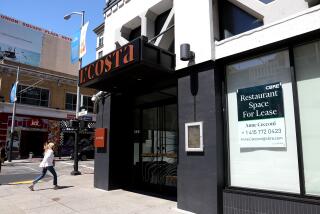Student Sleuths Gumshoe Through Atlantic City to Rate Its Hospitality : Tourism: The group gives the resort town--the first target--a lukewarm, 3 1/2-pineapple score after run-ins with a jitney driver and a waitress.
PROVIDENCE, R.I. â The jitney driver in Atlantic City, N.J., who snarled at Geraldine Reynoso when she took up an extra seat on his local bus would have been wise to hold his tongue. His words would come back to haunt him.
Reynoso, as it turned out, was a detective. Hospitality detective, that is.
She and a dozen fellow honors students at Johnson & Wales University were in the resort recently to sample restaurants, hotels, transportation, casinos--all the city had to offer its visitors.
When the sleuthing was done, a press conference was called and the hospitality verdict delivered: 3 1/2 pineapples.
On a scale of one to five pineapples (the studentsâ symbols of hospitality), that was not bad. But the marketing director for the Atlantic City Convention and Visitors Bureau said it clearly showed room for improvement.
âWe are talking to the jitney association to see if they can spruce up their temperaments a bit,â John Fox said. âWeâre in a strong state of transition here. There is no excuse for not being polite, but I think we have some of the same problems as big cities do around the country.â
Atlantic City was the first to be officially put to the test by the students at Johnson & Wales, a school based in Providence that specializes in travel, tourism and culinary arts.
It will not be the last, though. The students plan to visit about 20 cities with well-established tourism industries or plans to develop them. Ultimately, their efforts will yield a book informing readers whether a town offers top-drawer service (five pineapples) or is a travelerâs nightmare (one pineapple).
âThe 1980s was a marketing era,â said Paul Lacroix, chairman of the Travel & Tourism Department at Johnson & Wales and the guiding force behind âAmericaâs Most Hospitable Cities Survey.â
âEveryone went marketing,â he said. âNow we have the customers, and my question to students is, âWhat do we do with them?â I think the â90s is going to be an era of service. I think itâs a very natural follow-up to what has happened in the â80s.â
Lacroix began toying with the idea of a national hospitality survey in the fall; students developed the mechanism in class work.
They tried it out in Providence, a city trying to build tourism, then modified it considerably before setting off for Atlantic City.
Johnson & Wales sent four faculty advisers and 13 students to the resort city, where the students were set loose.
âI call them my SWAT team,â Lacroix said. âTheyâre my pineapple SWAT team.â
Students stopped at nearly 700 restaurants, casinos, hotels and other tourist attractions and racked up 1,748 âservice encounters.â
Reynoso, from River Vale, N.J., said the casinos, hotels and tourist attractions such as historic Smithville made Atlantic City worth the trip. But she and other students discovered several service problems.
Reynoso had a brusque encounter with the driver of a jitney, a small bus resembling a milk truck that is common in Atlantic City. The driver became angry when Reynosoâs easels and packages took up an extra seat.
Another group of students recalled that a waitress mocked them because she thought the tip they left was inadequate. The students were actually not finished and planned to leave more, Reynoso said.
âI liked it attraction-wise, but for service it was around average,â Reynoso said. âThey could use a lot more training.â
Student sleuths each spent $300 to $400 of university money checking out the city, making them the envy of a number of fellow students back in Providence.
But, Reynoso said, the survey was more work than they could have imagined.
âWe were very tired,â she said.
Students involved in the hospitality survey kept a daily log and reported on each service encounter. At the end of the weekend, they called a press conference, gave their pineapple rating and discussed their findings.
âI thought the review was quite fair,â Fox said. âAtlantic City is a city in strong transition.â
Lacroix declined to say where the next hospitality survey will take place but revealed that it will probably be in New England.
The program will concentrate on smaller cities such as Worcester, Mass.; Hartford, Conn.; Portland, Maine; Manchester, N.H., and Newport, R.I., before taking on Atlanta, Los Angeles, New York and Miami.
Lacroix expects that the guidebook based on the visits will be as helpful to the service industry and the cities as it is to consumers.
âAs far as I know, one like it does not exist,â he said. âThere are a lot of articles in terms of service quality slipping in America, but nothing as far as an organized program like this.â
More to Read
Sign up for The Wild
Weâll help you find the best places to hike, bike and run, as well as the perfect silent spots for meditation and yoga.
You may occasionally receive promotional content from the Los Angeles Times.






